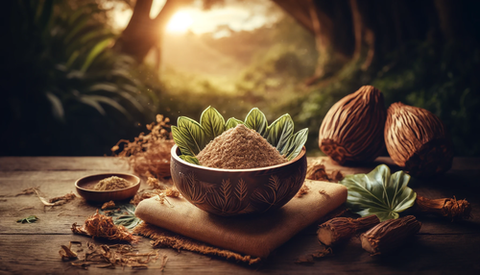
Is Kava Safe To Consume?
Share
Kava, a traditional beverage from the Pacific Islands, has gained traction worldwide for its calming effects. But with growing interest comes safety concerns. This guide dives deep into the science behind kava, exploring its potential benefits, risks, and responsible consumption practices.
 Kava and Potential Health Risks
Kava and Potential Health Risks
The Liver Damage Controversy: Separating Fact from Fiction
Kava's potential for liver damage has been a major concern, leading to restrictions and warnings in some countries. While past reports raised red flags, the current scientific understanding paints a more nuanced picture.
Here's what we know:
Dose Matters:
Studies suggest that high doses or long-term, excessive consumption of kava might increase the risk of liver problems. This emphasizes the importance of sticking to recommended dosages and not using kava chronically without consulting a healthcare professional.
Quality Counts:
Unfortunately, some kava products in the market might be adulterated with substances like commercial solvents or kavalactones extracted with unsafe methods. These adulterants can be toxic to the liver, highlighting the crucial role of choosing high-quality kava products from reputable sources.
Pre-existing Conditions:
If you have pre-existing liver problems, even moderate kava consumption can pose a greater risk. It's essential to disclose your complete medical history to your doctor before considering kava to ensure it doesn't interfere with your current health status.Beyond the Liver: Other Potential Side Effects
While liver damage is a significant concern, kava can also cause other, less severe side effects:Drowsiness:
Kava's calming properties can lead to drowsiness, especially at higher doses. Be cautious when operating machinery or driving after consuming kava.
Stomach Upset:
Some people experience digestive discomfort, including nausea and mild stomach upset, after consuming kava. This can be minimized by taking kava with food or choosing a gentler form, like kava tea.
Skin Irritation:
Topical application of kava can cause skin irritation, particularly for individuals with sensitive skin. It's advisable to perform a patch test before applying kava-based lotions or creams.
Crucial Interactions: Kava and Medications
Kava can interact with certain medications, potentially affecting their effectiveness or increasing the risk of side effects. This is particularly true for medications metabolized by the liver, as kava can compete for the same enzymes.
- Always disclose your kava use to your doctor. This allows them to assess potential interactions and adjust your medication regimen if necessary.
- Avoid combining kava with alcohol, sedatives, or other medications with depressant effects. This combination can significantly amplify drowsiness and impair coordination.
Risks Associated with Source and Quality: Why Your Kava Choice Matters
Not all kava is created equal. Here's why choosing high-quality kava is paramount:
- Quality Control: Reputable brands ensure their kava undergoes rigorous testing for purity and potency. This minimizes the risk of exposure to harmful adulterants or unsafe extraction methods.
- Standardized Products: Look for kavalactone content information on the label. This allows you to make informed choices about dosage and potential effects. Lower-quality kava might have unpredictable potency, making it difficult to control your intake.
- Transparency and Sourcing: Opt for brands that disclose their kava's origin and processing methods. Knowing where your kava comes from and how it's produced provides greater peace of mind.
By understanding the potential risks and making informed choices, you can navigate the world of kava with a focus on safety and responsible consumption. Remember, consulting a healthcare professional before using kava is vital to ensure it aligns with your individual health needs and doesn't interact with any medications you're taking.

A Look at Its History and Uses
Kava's Island Origins and Traditional Use
Our journey into the world of kava begins in the lush landscapes of the Pacific Islands, particularly Vanuatu, Fiji, Samoa, and Tonga. For centuries, kava has been a cornerstone of Pacific island cultures, holding a special place in social gatherings and ceremonies. Traditionally, kava is prepared by pounding dried kava root into a powder, then mixing it with water to create a beverage with an earthy, slightly peppery taste. This communal drink is often consumed during cultural events, fostering a sense of relaxation, sociability, and connection.
Kavalactones: The Calming Powerhouse
Kava's calming effects can be attributed to a group of unique compounds called kavalactones. These naturally occurring compounds within the kava root are believed to interact with the brain's neurotransmitters, particularly gamma-aminobutyric acid (GABA). GABA plays a crucial role in promoting relaxation and reducing anxiety. By influencing GABA activity, kavalactones are thought to contribute to kava's calming and stress-relieving properties.
Understanding Kava's Potential Benefits
Anxiety Management:
Research has explored kava's potential as a natural remedy for anxiety. Studies suggest that kava may be effective in reducing symptoms of generalized anxiety disorder (GAD). A 2013 review analyzed several clinical trials and concluded that kava demonstrated anxiety-reducing effects comparable to some conventional medications. However, more high-quality research is needed to definitively confirm kava's efficacy and optimal dosage for anxiety management.
Sleep Support (Needs More Research):Preliminary research suggests a possible link between kava and improved sleep quality. Studies indicate that kava may help individuals fall asleep faster and experience deeper sleep. However, the research in this area is limited, and further investigation is needed to solidify these findings and determine the most effective kava dosage for sleep support.
Pain Relief (Needs More Research):Some studies have explored the potential pain-relieving properties of kava. These studies suggest that kava may offer some relief from pain symptoms, particularly neuropathic pain. However, the quality of this research is limited, and more investigation is needed to understand kava's potential role in pain management.
Important Note: While the potential benefits of kava are promising, it's crucial to remember that research is ongoing. Always consult with a healthcare professional before using kava to determine if it's right for you, especially if you have any underlying health conditions or are taking medications.
Different Forms of Kava: Choosing the Right One
Kava is available in various forms, each offering its own set of advantages and disadvantages:
Kava Beverage (Traditional Method):This involves preparing a drink from dried, powdered kava root. It's the most traditional method, offering a sense of cultural connection. However, the taste can be unpalatable for some, and the potency can vary depending on preparation methods.
Kava Capsules:
These pre-measured capsules offer convenience and precise dosage control. However, the capsule shells may delay the onset of kava's effects, and some individuals may find them difficult to swallow.
Kava Extracts:Extracts are highly concentrated forms of kavalactones, typically sold in liquid or powder form. They offer a potent option for experienced users. However, due to their high concentration, extracts require careful dosing to avoid potential side effects.
Kava Powders:Similar to kava beverage but in a finer, powdered form. Powders can be mixed into drinks or smoothies but may have a stronger taste and require careful measuring for accurate dosing.
Choosing the right form of kava depends on your individual preferences and experience level. If you're new to kava, starting with capsules or a low-dose kava beverage is recommended. It's important to begin with a small amount and gradually increase the dosage as needed to assess your tolerance. Remember, responsible consumption is key when exploring the world of kava.
Conclusion
Kava, known for its potential in managing anxiety through its active compounds, kavalactones, offers a natural approach to relaxation and stress reduction. This has positioned it as an appealing option for those looking to alleviate anxiety naturally. Yet, the enthusiasm for kava is tempered by safety concerns, particularly regarding liver health. High doses or prolonged use have been linked to liver damage, raising questions about the balance between its benefits and risks.
Understanding the safety of kava involves considering several factors, including dosage, the quality of the product, and individual health conditions. It's crucial to start with low doses and choose kava from reputable sources to minimize risks. Moreover, consulting with a healthcare provider is essential, especially for those with existing health issues or those taking other medications. This ensures a personalized approach to kava consumption, balancing its potential advantages against possible health implications.

